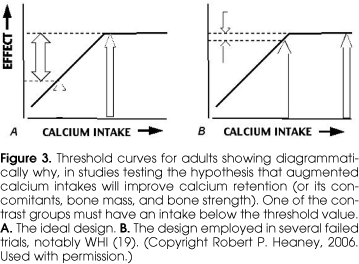While the fundamental metabolic function of calcium is to serve as a second messenger, coupling intracellular responses to extracellular signals, nutritional deficiency of calcium is manifested at a higher level of organization: 1) depletion of the calcium nutrient reserve; 2) inadequate complexation of digestive byproducts; and 3) collateral effects of hormones produced primarily to compensate for low calcium intake. The first mechanism contributes to the osteoporosis problem, the second to kidney stones and colon cancer, and the third to hypertension, preeclampsia, obesity, and insulin resistance, among others. Adequate calcium intakes (10001500 mg/d) in adults have been shown in controlled trials to lower the risk of osteoporotic fractures, kidney stones, obesity, and hypertension. The best source of calcium is dairy foods, largely because the disorders concerned depend upon multiple nutrients, not just calcium, and dairy provides a broad array of essential nutrients in addition to calcium, and at low cost.
Calcium; Osteoporosis; Fracture; Kidney stones; Colon cancer; Hypertension; Obesity; Insulin resistance




